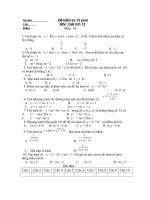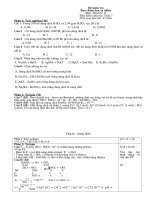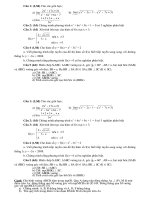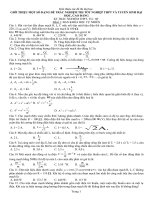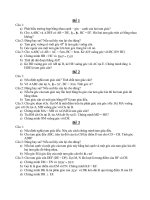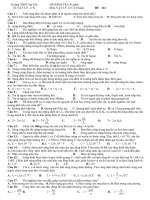Các đề kt 12
Bạn đang xem bản rút gọn của tài liệu. Xem và tải ngay bản đầy đủ của tài liệu tại đây (151.33 KB, 25 trang )
Name : ……………… english written Test no1
Class :12..... Time allowed: 45 minutes
Mark Remarks
I. Listen to the conversations and write the missing word(s). (1.5 points)
1. A. Peter and I are getting married. Your answers:
B. .. ..! When’s the happy day? …………… … 1. .…………
2. A. I’ve got an interview for a job today.
B. ...! I’ll keep my fingers crossed for you.……………… 2. .…………
3. A. I won the .. in the race.………… ……
B. Well done! I knew you could do it. 3. .…………
II. Pronunciation (1 pt)
Choose the word that has the underlined part pronounced differently from that of the others.
1. A. advised B. devised C. raised D. practiced 1……
2. A. shares B. attempts C. looks D. beliefs 2 ..…
Choose one word with different stress pattern.
3. A. party B. address C. country D. freedom 3. ..…
4. A. polite B. respect C. gesture D. divide 4. ..…
III. Choose the best answer (2.5pts))
1. My father has an older sister . We haven’t seen her ______ twenty years.
A. for B. since C. after D. during 1. ……
2. “Sorry. What did you say? I . to Carol.”…………
A. listen B. am listening C. was listening D. had listened 2. ……
3. Waving and handshaking are forms of communication.……
A. direct B. verbal C. non-verbal D. regular 3. ……
4. .. I was working in the garden, John was repairing the washing machine.………
A. while B. before C. as soon as D. until 4. .……
5. Maria: "Thanks for the lovely evening." – Diana: " ..."……………
A. Oh, that's right B. No, it's not good
C. Yes, it's really great D. I'm glad you enjoyed it 5. .……
6. My friend asked me what time .……………
A. the film starts B. the film started C. does the film start D. did the film start 6. .……
7. Our parents .hands to give us a nice house and a happy home.……………
A. wave B. shake C. join D. take 7. .……
8. The train ..when we arrived at the station.…………
A. was already leaving B. has left already
C. had left already D. had already left 8. .……
9. My responsibility is to wash the dishes and the garbage.……………
A. take up B. get out C. take off D. take out 9. .……
10. She . me she . ill in bed the day before.………… …………
A. asked/ was B. said/ had been
C. informed/ had been D. told/ had been 10. .……
1
Read the passage and then answer the following questions.(2.5 pts))
If you invite an American friend to join you to have dinner at a restaurant, phone the
restaurant first to find out if you need a reservation to avoid long wait for a table. To make the
reservation, just give your name, the number of people in your group, and the time you plan to
arrive. When you invite someone to dinner, you should be prepared to pay the bill and reach for it
when it arrives. However, if your companion insists on paying his or her share, do not get into
argument about it. Some people prefer to pay their own share so that they do not feel indebted, and
those feelings should be respected. In most American restaurants, the waiter or waitress’s tips is not
added to the bill. If the service was adequate, it is customary to leave a tip equal to about 15% of the
bill. In expensive restaurant, leave a bit more.
1. What should you do first if you want to invite an American friend to dinner at a restaurant?
……………………………………………………………………………………………………. .
2. What do you to do when making a reservation?
…………………………………………………………………………………………………… .
3. Why do some people prefer to pay their own share of the meal?
…………………………………………………………………………………………………….. .
4. How much is an appropriate tip in most American restaurant?
……………………………………………………………………………………………………… .
5. Why should you need a reservation for the meal?
……………………………………………………………………………………………………… .
V. Use these suggestions to write sentences. (2.5 pts)
The hanbok (Trang phôc truyÒn thèng cña Hµn Quèc)
1. The hanbok/ be/ the traditional costume/ Korean people.
-> . ...……………………………………………………………………………………… ……
2. Hanboks/ be often characterized by vibrant colours/ simple lines without pockets.
-> ..………………………………………………………………………………………………
…………………………………………………………………………………………………..
3. The materials used/ make hanboks/ vary/ according/ the season or/ person’s status in society.
-> .…………………………………………………………………………………………
4. The women’s hanbok/ comprise/ a wrap-around skirt and a bolero-like jacket/ while/ the
men’s/ consist/ of a short jacket and pants.
-> .………………………………………………………………………………………………
…………………………………………………………………………………………………
5. Today/ Korean people/ wear/ hanbok/ traditional holidays and when/ attend/ social affairs with
a traditional Korean theme.
-> ………………………………………………………………………………………………
…………………………………………………………………………………………………
2
Name: .………………………… English written Test No.1
Class: ……………… Time allowed: 45 minutes
Mark Remarks
I. Listening (1.5 pts) Listen to the conversations and write the missing word(s).
1. A. John can’t play today. It seems he’s had an accident. Your answers
B. Oh dear. It’s ..serious, I hope. ……… 1 .…… …
2. A. I’m afraid I failed my driving test. - B. Oh well, never mind. next time.… 2. ………
3. A. Happy birthday, Mummy! - B. Thank you very much. of you.…………… 3. ………
II. Phonetics: (1 pt)
A. Choose the word whose underline part is pronounced differently.
1. A. obliged B. determined C. believed D. kissed 1. ..…
2. A. stops B. plays C. works D. shifts 2. ..…
B. Pick out the word whose main stressed syllable is different.
3. A. certain B. couple C. decide D. equal 3……
4. A. notice B. party C. social D. polite
4……
III.Vocabulary and grammar: (2.5 pts) Choose the best answer
1. When I home last night, I that Jane a beautiful candlelight dinner.…… …… … 1. ..…
A. had arrived / discovered / prepared B. was arriving / had discovered / was preparing
C. have arrived / was discovering / had prepared D. arrived / discovered / was preparing
2. Many Vietnamese people ... their lives for the revolutionary cause of the nation
A. sacrifice B. sacrificed C. sacrificial D. sacrificially 2……
3. When my mother is busy preparing dinner, my father often gives a hand tidying the living room……
A. on B. with C. for D. about 3 ……
4. “You look great in this new dress.” - “ ..”………………
A. With pleasure B. Not at all
C. Thank you. I am glad you like it D. Do not say anything about it 4 ..…
5. He asked me Robert and I said I did not know .………… ……………………
A. that did I know / who were Robert B. that I knew / who Robert were
C. if I knew / who Robert was D. whether I knew / who was Robert 5. ..…
6. He advised too far.……
A. her did not go B. her do not go C. her not to go D. she did not go 6. ..…
7. She asked me .. my holidays .…………… ………………
A. where I spent / the previous year B. where I had spent / the previous year
C. where I spent / last year D. where did I spend / last year 7 .……
8. In most social situations where people of acquaintance meet each other .way of greeting is …
allowed.
A. formal B. informal C. serious D. artificial 8. ...……
9. The host asked Peter tea or coffee.…………
A. whether he preferred B. that he preferred C. did he prefer D. if he prefers 9. . .… …
10. In many cultures, people signify their agreement by their head.……………
3
A. turning B. raising C. pointing D. nodding 10 . .… …
Reading:Read the passage then answer the questions (2.5 pts)
Vietnamese generally shake hands when greeting and parting. Using both hands show respect, as
does a slight bow of the head. In rural areas, elderly people who don’t extend their hand are
greeted with a slight bow. Women are more likely to bow the head slightly than to shake hands.
Vietnamese names begin with the family name and are followed by a given name. For example, in
the name Nguyen Van Duc, Nguyen is the family name. People address one another by their given
names, but add a title that indicated their perceived relationship to the other person. These titles are
family related rather than professional. Among colleagues, for example, the younger of the two
might combine the given name with the title of Anh (“older Brother). A basic greeting combined
with the given name and title is Xin chao (“Hello”). Classifiers for gender and familiarity are also
combined with the greeting. In formal meetings, business cards are sometimes exchanged on
greeting.
Vietnamese have a strong sense of hospitality and feel embarrassed if they cannot show their
guests full respect by preparing for their arrival. Therefore, it is inappropriate to visit a home
without having been invited. Gifts are not required, but are appreciated. Flowers incense, or tea
may be appropriate gifts for the hosts. Hosts also appreciate a small gift for their children or
elderly parents.
1. What is the way of greeting to show respect?
………………………………………………………………………………………………
2. How are Vietnamese names formed?
………………………………………………………………………………….…………
3. How do people address one another in Vietnam?
…………………………………………………………………………………..…………
4. What does the greeting include?
…………………………………………………………………………………….…
5. What is the tendency to have home guests in Vietnam?
…………………………………………………………………………………………
V. Writing: Use the suggestions to write complete sentences. (2.5 pts)
1. The Ao dai/ be / traditional dress/ Vietnamese women.
…………………………………………………………………………………………
2. It / consist/ a long silk tunic / be/ slit / sides / worn over / loose paint.
………………………………………………………………………………………………
3. The Ao dai / can / worn/ weddings /other formal occasions
…………………………………………………………………………………………
4. "Ao dai" / be/ one / few Vietnamese words / appear / English-language dictionaries
……………………………………………………………………………………………….……
……………………………………………………………………………………………………
5. To/ Vietnamese people, rich/ poor, the Ao dai/ be/ still / dress chosen/ social occasions /enjoy/
it / special occasions/ as well.
………………………………………………………………………………………….………
……………………………………………………………………………………………………
4
1. A. looked B. booked C. naked D. cooked
2. A. dates B. chores C. talks D. helps
14. The most common way of attracting someone
’
s attention from a distance is ..............
A. smiling B. nodding C. waving D. handshaking
21. My mother ___ the responsibility for running the household.
A. holds B. takes C. runs D. bears
22. : Maria: “How well you are playing tennis!” – Diana: “______”
A. Say it again. I like to hear your words. B. I think so. I’m proud of myself.
C. Thank you too much. D. Many thanks. That is a nice compliment.
Name: ............................................. English written test - No 2
Class: 12... Time allowed: 45 minutes
Mark Remark
I. Listen and choose the best answer. (1.5 pts)
1. When he left school, Maximilian started work ................... .
A. on a farm B. in a factory C. on a ship D. in television 1. ...
2. He became a millionaire at the age of ................... .
A. 30 B. 18 C. 25 D. 52 2. ...
3. The money he earned didn't make him ....................... .
A. rich B. a millionaire C. really happy D. stop working 3. ...
II. Choose one word with different stress pattern. ( 1 pt)
1. A. vacancy B. interview C. encourage D. concentrate 1. ..
2. A. enthusiastic B. qualification C. international D. recommendation 2. ..
3. A. suitable B. possible C. pressure D. disappoint 3...
4. A. academic B. certificate C. experience D. technology 4...
III. Choose the best answer to complete the sentences. (2.5 pts)
1. To satisfy this ................., you must complete the 15 year-long high school courses listed below.
A. require B. required C. requiring D. requirement 1...
2. If Tom ............., tell him I will phone him back.
A. rings B. rang C. rung D. has rung 2...
3. If he .............. my advice, he wouldn't have ended up in prison.
A. takes B. took C. has taken D. had taken 3...
5
4. If the storm gets worse, we ................. come back.
A. didn't B. would C. will D. had 4...
5. I have two sisters, .............. are very good at computer science.
A. both of who B. whom C. both of them D. both of whom 5...
6. She is going to sell her company, .............is a great shame.
A. that B. whom C. which D. it 6...
7. If he didn't eat too much, he .......................... overweight.
A. won't be B. wouldn't be C. wouldn't have been D. can't be 7...
8. Is this knife for ......................... potatoes?
A. peel B. peeled C. to peel D. peeling 8...
9. Last week, we visited the town ................. Shakespeare was born.
A. which B. on which C. that D. where 9...
10. I met some people ................. car had broken down on the way.
A. their B. having C. whose D. whom 10...
IV. Read the passage and answer the questions.(2.5 pts)
A-level (Advanced level) is a British exam taken in a particular subject, usually in the final
year of school. A-levels are still the most common way of fulfilling the entry requirements for
degree courses in universities. Most students in the UK start preparing for A-level exams when they
are aged around sixteen or seventeen and courses normally last for two years, although some
independent colleges and some colleges of further education offer intensive one-year A-level
courses. Students usually take between two and four subjects at one time and will normally be
expected to have a GCSE (General Certificate of Secondary Education) or equivalent qualification in
the subjects they wish to take at A-level. Assessment for most subjects is in the form of written
exam at the end of the course. Passes are graded between A and E with A being the highest. An AS
level (Advanced Supplementary) is of an equivalent standard to an A-level but has half the subject
content. In terms of entrance requirements for a degree course, two AS levels cont as one A-level.
AS levels are sometimes taken by students who feel that it is too early to specialize and wish to take
a wider variety of subjects.
1. What is an A-level exam?
........................................................................................................................................ .
2. When do most students in the UK start preparing for A-level exams?
......................................................................................................................................... .
3. Who often take AS levels?
....................................................................................................................................... .
4. How are passes graded?
...................................................................................................................................... .
5. How many subjects do students often take at one time?
........................................................................................................................................ .
V. Rewrite the sentences using the suggestions.(2.5 pts)
6
Dear Sir,
1. I/ writing/ apply for the post/ part-time librarian/ your university.
....................................................................................................................................... .
2. I/ 22 years old/ and/ just graduated/ university.
...................................................................................................................................... .
3. I/ speak fluent English/ and/ work / computer very well.
...................................................................................................................................... .
4. I/ friendly/ patient/ and/ worked/ a librarian/ 6 months.
...................................................................................................................................... .
5. I hope/ be chosen/ the job.
I look forward to hearing from you.
Your faithfully,
Mary Jones
Name: ............................................. English written test - No 2
Class: 12... Time allowed: 45 minutes
Mark Remark
I. Listen carefully and choose the best word or phrase to complete the sentences. (1.5 pts)
1. At the age of 18, he ................................ .
A. went back to the village B. left the village C. got married D. was offered a job 1...
2. He learned quickly and earned a lot of money ..................... .
A. on the ship B. on the farm C. on Wall Street D. on television 2...
3. For the last ten years he has lived .............................. .
A. happily B. alone C. with his family D. with his first wife 3...
II. Choose one word with different stress pattern. ( 1 pt)
1. A. application B. emergency C. distribution D. entertainment 1...
2. A. vacancy B. remember C. impression D. position 2...
3. A. tutorial B. majority C. available D. consequences 3...
4. A. original B. institution C. application D. graduation 4...
III. Choose the best answer to complete the sentences. (2.5 pts)
1. To satisfy this ................., you must complete the 15 year-long high school courses listed below.
A. require B. required C. requiring D. requirement 1...
2. If Tom ............., tell him I will phone him back.
A. rings B. rang C. rung D. has rung 2...
7
3. If he .............. my advice, he wouldn't have ended up in prison.
A. takes B. took C. has taken D. had taken 3...
4. If the storm gets worse, we ................. come back.
A. didn't B. would C. will D. had 4...
5. I have two sisters, .............. are very good at computer science.
A. both of who B. whom C. both of them D. both of whom 5...
6. She is going to sell her company, .............is a great shame.
A. that B. whom C. which D. it 6...
7. If he didn't eat too much, he .......................... overweight.
A. won't be B. wouldn't be C. wouldn't have been D. can't be 7...
8. Is this knife for ......................... potatoes?
A. peel B. peeled C. to peel D. peeling 8...
9. Last week, we visited the town ................. Shakespeare was born.
A. which B. on which C. that D. where 9...
10. I met some people ................. car had broken down on the way.
A. their B. having C. whose D. whom 10...
IV. Read the passage and answer the questions.(2.5 pts)
A-level (Advanced level) is a British exam taken in a particular subject, usually in the final
year of school. A-levels are still the most common way of fulfilling the entry requirements for
degree courses in universities. Most students in the UK start preparing for A-level exams when they
are aged around sixteen or seventeen and courses normally last for two years, although some
independent colleges and some colleges of further education offer intensive one-year A-level
courses. Students usually take between two and four subjects at one time and will normally be
expected to have a GCSE (General Certificate of Secondary Education) or equivalent qualification in
the subjects they wish to take at A-level. Assessment for most subjects is in the form of written
exam at the end of the course. Passes are graded between A and E with A being the highest. An AS
level (Advanced Supplementary) is of an equivalent standard to an A-level but has half the subject
content. In terms of entrance requirements for a degree course, two AS levels count as one A-level.
AS levels are sometimes taken by students who feel that it is too early to specialize and wish to take
a wider variety of subjects.
1. When is an A-level exam taken?
................................................................................................................................ .
2. How long do preparing courses normally last?
................................................................................................................................ .
3. What is an AS level?
............................................................................................................................. .
4. How many AS levels can count as one A-level?
............................................................................................................................. .
5. What is the assessment for most subjects?
8
............................................................................................................................... .
V. Use the suggestions to write complete sentences of a letter of application. (2.5 pts)
Dear Ms. Brown,
1. I/ interested/ applying/ post/ part-time Import & Export Clerk.
.............................................................................................................................................. .
2. I/ 20 years old/ and/ third-year student.
............................................................................................................................................. .
3. I/ speak and write/ fluent English and Italian/ and/ have/ one year experience/ office work.
.................................................................................................................................................
................................................................................................................................................
4. I think/ I/ be suitable/ the post/ and I / come/ interview/ any time/ convenient/ you.
.................................................................................................................................................
5. I/ look forward/ hear/ you.
Yours sincerely,
David James.
Name: ............................................. English written test - No 2
Class: 12... Time allowed: 45 minutes
Mark Remark
I. Listen and choose the best answer. (1.5 pts)
1. When he left school, Maximilian started work ................... .
A. on a farm B. in a factory C. on a ship D. in television 1. A
2. He became a millionaire at the age of ................... .
A. 30 B. 18 C. 25 D. 52 2. C
3. The money he earned didn't make him ....................... .
A. rich B. a millionaire C. really happy D. stop working 3. C
II. Choose one word with different stress pattern. ( 1 pt)
1. A. vacancy B. interview C. encourage D. concentrate 1. C
2. A. enthusiastic B. qualification C. international D. recommendation 2. C
3. A. suitable B. possible C. pressure D. disappoint 3. D
4. A. academic B. certificate C. experience D. technology 4. A
III. Choose the best answer to complete the sentences. (2.5 pts)
1. To satisfy this ................., you must complete the 15 year-long high school courses listed below.
A. require B. required C. requiring D. requirement 1. D
9
2. If Tom ............., tell him I will phone him back.
A. rings B. rang C. rung D. has rung 2 A
3. If he .............. my advice, he wouldn't have ended up in prison.
A. takes B. took C. has taken D. had taken 3.D
4. If the storm gets worse, we ................. come back.
A. didn't B. would C. will D. had 4.C
5. I have two sisters, .............. are very good at computer science.
A. both of who B. whom C. both of them D. both of whom 5.D
6. She is going to sell her company, .............is a great shame.
A. that B. whom C. which D. it 6.C
7. If he didn't eat too much, he .......................... overweight.
A. won't be B. wouldn't be C. wouldn't have been D. can't be 7.B
8. Is this knife for ......................... potatoes?
A. peel B. peeled C. to peel D. peeling 8.D
9. Last week, we visited the town ................. Shakespeare was born.
A. which B. on which C. that D. where 9.D
10. I met some people ................. car had broken down on the way.
A. their B. having C. whose D. whom 10.C
IV. Read the passage and answer the questions.(2.5 pts)
A-level (Advanced level) is a British exam taken in a particular subject, usually in the final
year of school. A-levels are still the most common way of fulfilling the entry requirements for
degree courses in universities. Most students in the UK start preparing for A-level exams when they
are aged around sixteen or seventeen and courses normally last for two years, although some
independent colleges and some colleges of further education offer intensive one-year A-level
courses. Students usually take between two and four subjects at one time and will normally be
expected to have a GCSE (General Certificate of Secondary Education) or equivalent qualification in
the subjects they wish to take at A-level. Assessment for most subjects is in the form of written
exam at the end of the course. Passes are graded between A and E with A being the highest. An AS
level (Advanced Supplementary) is of an equivalent standard to an A-level but has half the subject
content. In terms of entrance requirements for a degree course, two AS levels cont as one A-level.
AS levels are sometimes taken by students who feel that it is too early to specialize and wish to take
a wider variety of subjects.
1. What is an A-level exam?
........................................................................................................................................ .
2. When do most students in the UK start preparing for A-level exams?
......................................................................................................................................... .
3. Who often take AS levels?
....................................................................................................................................... .
4. How are passes graded?
10
